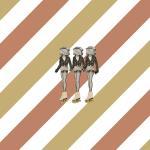
Say Hi Diamonds & Donuts
(Euphobia)
It’s said that the music you listen to when you’re growing up makes such an indelible impression that it forever colors your tastes and predilections. If you came of age in the early aughts, it’s likelier than not that you will always gravitate to the kind of pure indie rock emblematized by Say Hi (maybe you remember it as Say Hi to Your Mom; Eric Elbogen lopped off the last two thirds around 2008). And if you didn’t know Say Hi specifically, you knew Barsuk Records and the dozens of now forgotten and frankly fungible groups (Cymbals Eat Guitars, Menomena, Starlight Mints, Ra Ra Riot, Kind of Like Spitting) that dissipated into the millennial ether.
Diamonds & Donuts was released quietly, the second album after Elbogen’s supposed 2017 retirement from Say Hi, but the first diversion from the formula. To say that this album is heavier on the synthesizers than Say Hi’s previous releases would be putting it astonishingly mildly. Diamonds relies so heavily on synths that one would think it would be utterly unrecognizable as something that had its roots in the indie rock scene 15 years ago. In fact, the most successful tracks are those that fit into that exact milieu—the slight pop beat on the opening track sets a promising tone; Windsor Knots and Ruffles happily lacks the overbearing intensity of some of the fussier tracks, though the sugary lyrics leave something to be desired; Non-Linear Time vs. Misshapen Space croons softly through history; A MacBook Pro to a Nineties Dell is a delightful tongue-in-cheek dance number that feels right at home at any 2004 basement show. But on the whole, the choice to rely so heavily on synths doesn’t quite make sense. To flip back to any earlier record is a breath of fresh air, and puts the best parts of this record—the familiar lyrical turns begging for guitar riffs—into sharp relief.
That isn’t to say that there wasn’t some fantastic synth-based music coming out of the early 2000s; Metric, The Faint, The Rapture, Ladytron – these and many more knew how to weave synthesizers in and out of their music just so. Nor is it to say that artists shouldn’t experiment with new sound (though why experimentation is nearly always synonymous with electronics is a head-scratcher). Rather, there’s the persistent niggling thought that in spite of the growth and experimentation, the only good left on the album is the familiar, and is the familiar really so good if only the aging few of us remember it?
6 March, 2020 - 15:37 — Gabbie Nirenburg